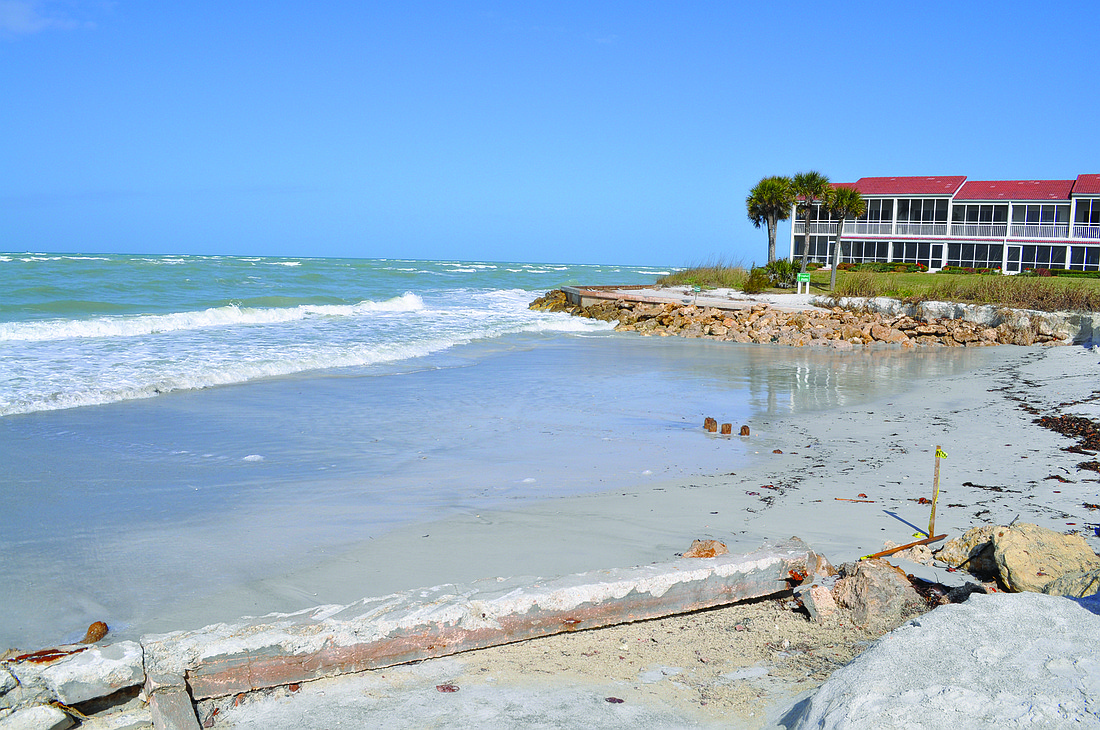- April 19, 2024
-
-
Loading

Loading

Longboat Key’s taxpayers have paid for their beach projects for years because they’re picky about the way their coastline looks.
By using two taxpayer-approved beach assessment taxing districts to pay for projects instead of using federal dollars for U.S. Army Corps of Engineers beach projects, the town gets sand onto the island at a faster pace. That process also allows the town to select the type of sand it wants.
But that could change if the Longboat Key Town Commission decides it wants to use federal dollars for future beach projects.
At its Feb. 18 workshop, Town Manager Dave Bullock told commissioners that he met with Corps officials at a beach conference two weeks ago to discuss the possibility of becoming eligible for federal beach dollars.
Corps officials informed Bullock that their department evaluated the Key 20 years ago and established the island was eligible for federal dollars at that time.
The problem is, it takes three years for the Corps to perform the study that results in attaining money for a federal project. A north end sand and structure project wouldn’t be eligible for federal dollars.
The Corps will know in a month if it has money in its budget to perform an updated study for the island, which would result in Corps officials coming before the commission for a special workshop to discuss the three-year study.
Commissioner Phill Younger expressed frustration that beach engineers have previously told the commission it would take 10 to 15 years to be eligible for a project.
“We’ve been eligible and could have started this process six years ago and been eligible for the upcoming project,” Younger said. “We kept being told it would take too long and that’s not the case.”
When Mayor Jim Brown asked Bullock if the commission was misled by previous consultants, Bullock said, “I think coastal engineers and the Corps are in constant competition with each other…that’s all I’m going to say about it.”
But if the commission moves forward with the Corps study, Bullock warned commissioners of several contingencies that must be met to attain federal dollars.
The amount of funding the town would receive for a project is contingent on its number of beach accesses and parking spots.
“Public access is a big, big deal with the Corps and we have less accesses than other islands,” Bullock said.
Bullock also noted the Corps “is not necessarily in the fine white sand business.”
“You have to buy up to get whiter sand,” Bullock said.
Last but not least, Bullock said you have to wait for money.
“We can’t pay for a project and be reimbursed for it,” Bullock said. “We’re stuck waiting for them to come perform projects on their timetable once the project is funded.”
Bullock said the city of Sarasota is still waiting for a Lido Beach project to be funded that was originally brought forward in 1999.
“They are still waiting on construction money, to show you how long it can take,” Bullock said.
Bullock also outlined advantages to using the corp for future projects.
The Corps pays for 55% to 60% of a federal beach project.
“That funding share goes up if a federal channel contributes to the loss of sand,” Bullock said. “We certainly fall into that category.”
And if a storm is responsible for loss of sand after a Corps project has already been performed, the Corps fully funds a future project to restore the beach.
Commissioner Pat Zunz said taxpayers might have issues with the town aligning itself in the future with the Corps.
“There has historically been resistance in our community not to pursue the Corps because of beach accesses, more parking and concern we would no longer have control,” Zunz said.
SAND SHARING
Town Manager Dave Bullock told the commission at its Feb. 18 workshop that he is working with city of Sarasota officials for a future sand sharing agreement for dredging New Pass.
The city has agreed to share the sand that could be deposited on Longboat Key and Lido Beach when federal money becomes available to dredge New Pass, which is expected in the next two years, Bullock said.
Contact Kurt Schultheis at [email protected]